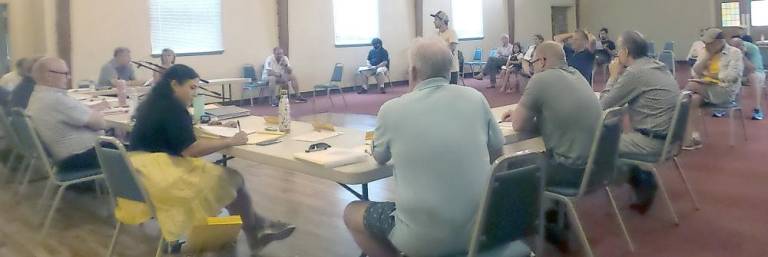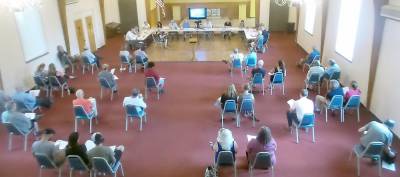Milford Borough approves earned income tax to address financial woes
Milford. Councilman Pete Cooney, the lone no vote in the 6-1 decision, promises to launch campaign of repeal.


There was almost a collective sigh of relief on July 20, when the Milford Borough Council passed the earned income tax (EIT) to address its financial straits. Borough residents will start paying the tax on Oct. 1.
The wolf is at the door. Borough president Frank Tarquinio told the Courier after the meeting that he’d been forced to shift money around in the budget to keep the borough financially viable. That’s no way to run any kind of a financial operation, he said.
Councilman Rob Ciervo made an impassioned speech. “I have to pay,” he said. “This money is going to do more good than bad.”
In emails following the meeting, Mayor Sean Strub said Ciervo and his company “has not just provided labor on more occasions than anyone could count, but also materials, fixing and repairing issues in our parks, streets and borough buildings.” In arguing for the EIT, Strub, Ciervo, and Councilman Joe Dooley said that multitudinous volunteer efforts over many years could no longer keep the borough afloat without eliminating major safety services such as the borough police.
“We have gotten along this far, meeting our budget each year without additional revenue despite rising costs, in large part because of extensive volunteerism, of time and other resources, by members of the Council, our staff and many community volunteers,” Strub said.
The EIT passed in a 6-1 vote. The lone no vote was cast by Councilman Pete Cooney.
“It was a done deal before it started,” said Cooney after the meeting. “It was all over before it started, and I will lead a campaign to repeal the EIT in Milford Borough.”
He did not suggest a solution to the financial crisis and repeatedly interrupted Dooley, Ciervo, and Strub as they attempted to explain why it’s needed. The council had held a public hearing on the EIT on June 30.
“I don’t like the EIT, as I believe it is a regressive tax, and I hate that it falls on people who are working, especially the hourly workers at my business and others in town,” said Strub said in an email following the July 20 meeting. “But the PA legislature has left municipalities little choice; that’s why 97% of the PA municipalities, including Matamoras and Westfall, have an EIT. When Pike County goes through a reassessment, it could be repealed by a simple vote of the Borough Council.”
Strub said he wouldn’t be a part of selling off Milford’s iconic Biddis Park, as some have proposed. He said selling off the parking lot wouldn’t work, as the borough would be required to pay back the grant used to buy it and have little money left over.
“I’m running for reelection,” Strub said. “It would have been easy for me to grandstand and oppose the EIT. But it wouldn’t have been responsible. It is more important that I act responsibly than it is that I get reelected. This council took a necessary and courageous, but unpopular step. I appreciate and admire their leadership.”
Police a priority
The council said funding the Milford Police Department was a major priority.
“What I hear from borough residents about more than anything else is our police department,” said Strub in an email. “I hear the community’s appreciation, especially for the pedestrian and bicycle patrols and other aspects of our ‘community policing.’ But I also hear from Milford residents that they want more enforcement by MPD, to cite those who speed, roll through stop signs or other moving violations. I want this as well.
He said that in the five years since he became mayor, the borough has spent about 12 percent less on the police department than in the five years previous to his becoming mayor. “Some of that is due to efficiencies we’ve found, but most of it due to the borough providing less policing because we didn’t have the money,” he said.
Once, the borough routinely had two officers on duty during peak periods but now almost never does, he said.
“Yet even with those budget cutbacks, the Milford Police Department is running more smoothly and has better esprit de corps than anytime in recent memory, thanks to the leadership of Chief Matt McCormick,” wrote Strub. “We have better officer retention, provide more training and are truly delivering community policing to Milford residents, property owners and visitors.”
The EIT will allow the police department to return to two officers on duty during peak hours, he said, “which will help greatly with enforcement, and provide the policing borough residents want and deserve.” Without the tax, coverage would likely be cut back even more than it is now, with the overnight 11 p.m. to 7 a.m. shift suspended.
“That’s a stark choice, but it is reality,” Strub said.
Fixing the borough’s inadequate drainage system is another priority.
“What the EIT will do is make us able to prepare engineering studies to figure out the best plan to move forward with stormwater management,” said Dooley in an email. “The solution for stormwater is much more costly than the EIT will solve. We hope to obtain grants to enable us to deal with our stormwater issues in an ecological manner.”
He said his vision for the borough is “to continue to provide the quality services we currently provide, to include 24/7 police protection, while at the same time fixing our sidewalks, figuring out stormwater issues, ensuring our streets are clean and free of litter, enhancing our parks, etc.”
Strub elaborated on the contributions of volunteers and nonprofit: Councilwoman Maria Farrell took on the task of cleaning benches throughout the borough and spreading mulch in the Ann Street Park playground. Councilwoman Adriane Wendell spent hundreds of hours updating the borough code. Two hundred people showed up for Bill Kiger Community Cleanup Day. The Milford Enhancement Committee spent $7 million on streetscapes in the past 20 years. Police Chief McCormack, Officer Troyan and other members of the department did a lot of renovation work on the new Broad Street station as volunteers. The Parks and Recreation Committee and Shade Tree Commission did their share.
“No one wants another tax, that’s for sure, but most people in the borough I’ve heard from, especially those who are knowledgeable about the borough’s finances, are resigned to the reality that we have little other choice. That’s why six members of the Council voted in favor of it.”
Editor’s note: This story has been updated to remove a quote from the borough treasurer, Greg Myer, that the borough ran out of money in July. Myer did not say this. The Courier regrets the error.


